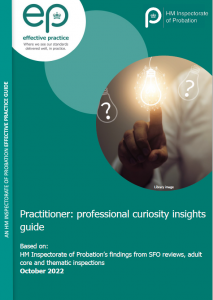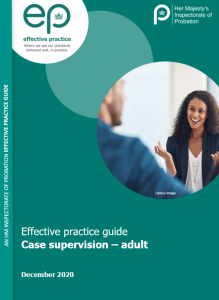Case supervision
 Inspectors assess the quality of case supervision by reviewing the case sample in accordance with the ASPIRE process:
Inspectors assess the quality of case supervision by reviewing the case sample in accordance with the ASPIRE process:
- Assessment
- Sentence Planning
- Implementation
- Review
- Evaluate.
A significant element of HM Inspectorate of Probation’s work is to assure that practice in case supervision, through the lenses of engagement, desistance, keeping children safe and keeping other people safe, is effective and firmly grounded in the best available evidence and learning.
Engagement is a central tenant when working with children and people on probation.
“take time to get to know us and understand us.”
– Anon, child working with youth justice services
“My officer said to me once ‘probation is not just about punishment, let us help you change your life for the better’. This made me think differently about probation.”
– Anon, person on probation
Desistance is the process of abstaining from crime by those with a previous pattern of offending. Desistance is often described as a journey, influenced by someone’s circumstances, the way they think, and what is important to them. It is an ongoing process and often involves some false stops and starts – it can take considerable time to change entrenched behaviours and the underlying problems.
“Help us get to move on to the next stage – like job and college interviews.”
– Anon, child working with youth justice services
“It’s hard when somebody has offended but most people do have skills and strengths that can help them to change”.
– Anon, person on probation
It is fundamental to practice to keep children safe and ensure their wellbeing. Risks to the safety and wellbeing of the child may come from external sources or may relate to their behaviour.
Examples of external sources of safety and wellbeing concerns include discrimination, familial abuse or neglect, exploitation by older or more sophisticated offenders, sexual exploitation or bullying.
Internal sources of safety and wellbeing concerns could include mental or physical health, substance misuse, risk-taking behaviour or a low sense of self-worth.
This should also consider the impact of the child’s own behaviour on their safety and wellbeing; including identifying any physical or mental health concerns, missing from home episodes, substance misuse or behaviour that may place them at risk.
“Help us find places to go where we can feel comfortable and safe.”
– Anon, child working with youth justice services
Keeping people safe is a fundamental expectation, which forms part of the core objectives of the work of probation and youth offending services. At its core, keeping people safe is about public protection and assessing/managing safety to protect both known and potential future victims.
“Children and young people need more supervision in their communities – encourage us to build positive relationships, help us find good interesting things we like doing together.”
– Anon, child working with youth justice services
“It is the job of probation to be curious and a bit nosey, especially with domestic abuse and the safety of children. Although it can feel intrusive from the service user’s point of view, it is needed.”
– Anon, person on probation
The resources we have developed to date are:
 Effective Practice – Working with young adults
Effective Practice – Working with young adults
This effective practice guide is based on examples observed while undertaking the thematic inspection ‘The quality of services delivered to young adults in the Probation Service’.
Read the Working with young adults EP guide.
 Effective Practice – Working with women (PDF, 1 MB)
Effective Practice – Working with women (PDF, 1 MB)
This guide explores effective and developing practice in relation to working with women being released from custodial sentences or serving community sentences.
Read the Working with women EP guide. (PDF, 1 MB)
 Effective Practice – Developing operational structures and the Senior Probation Officer role (January 2024) (PDF, 1 MB)
Effective Practice – Developing operational structures and the Senior Probation Officer role (January 2024) (PDF, 1 MB)
This guide considers the operational structures and roles required to provide effective management oversight and to support the work of senior probation officers.
 Effective Practice – Children subject to or at risk of remand in youth detention accommodation (November 2023) (PDF, 2 MB)
Effective Practice – Children subject to or at risk of remand in youth detention accommodation (November 2023) (PDF, 2 MB)
This guide explores effective and developing practice in relation to youth remand for both youth justice services and their operational and strategic partners.
Effective practice guide: Working with domestic abuse (adult services) July 2023 (PDF, 3 MB)
This guide provides some guiding principles for working with domestic abuse perpetrators and victims, and highlight examples where we have seen our standards delivered well.
Read the Working with domestic abuse (adult services) EP guide. (PDF, 3 MB)
Effective practice guide: Offender Management in Custody, post-release (adult services) March 2023 (PDF, 2 MB)
This guide breaks down what good OMiC work looks like against our inspection standards. With real-life examples and frontline perspectives, this guide explores how probation practitioners can deliver effective case management.
Read the Offender Management in Custody (post-release) EP guide. (PDF, 2 MB)
Effective practice guide: Offender Management in Custody, pre-release (adult services) November 2022 (PDF, 2 MB)
This guide breaks down what good OMiC work looks like against our inspection standards. With real-life examples and frontline perspectives, this guide explores how probation practitioners can deliver effective case management.
Read the Offender Management in Custody (pre-release) EP guide. (PDF, 2 MB)
Effective practice guide: Practitioners – professional curiosity insights (adult services) (October 2022)
Through real-life examples, handy tools and frontline perspectives, this guide explores how professional curiosity is linked to the everyday work of probation practitioners.
Read the practitioners professional curiosity insights guide.
Effective practice guide: Middle managers – professional curiosity insights (adult services) (October 2022)
The supplementary middle managers guide sets out the leadership role in creating a culture to enable professional curiosity in the workplace.
Read the middle managers professional curiosity insights guide.
Effective practice guide: Youth effective case supervision (January 2021)
This comprehensive guide provides an overview of case supervision in context, what effective supervision looks like and the research which underpins this. Using the ASPIRE model we examine engagement, desistance and keeping people safe in youth justice.
Effective practice guide: Adult effective case supervision (December 2020)
This comprehensive guide provides an overview of case supervision in context, what effective supervision looks like and the research which underpins this. Using the ASPIRE model we examine engagement, desistance and keeping people safe in the Probation Service.
You can read more about the research which underpins case supervision here:
Adults
Supervision of service users (the evidence base – probation services).










